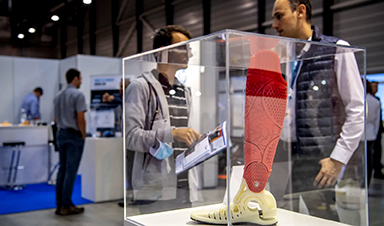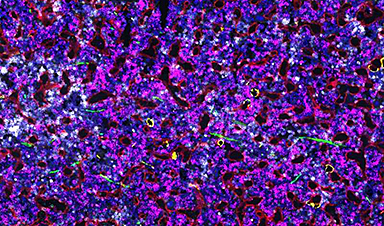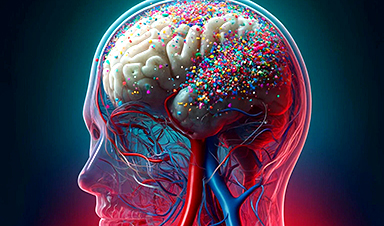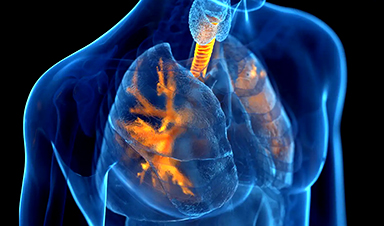At Cambridge University’s MRC Mitochondrial Biology Unit, Michal Minczuk is one of a growing number of scientists around the world aiming to find new ways of improving mitochondrial health. This line of research could help provide much-needed treatments for people with long Covid, as well as revolutionising our understanding of everything from neurodegenerative illnesses such as Parkinson’s disease to the ageing process.
Mitochondria, tiny tube-shaped structures that are found in their hundreds, sometimes thousands, in nearly all of our cells, are best known as the body’s power plants, continuously converting the food we eat into ATP, a complex chemical that acts as a form of energy currency for cells. Without ATP, every one of our cells, from the brain to the muscles, would lack the fuel they need to keep churning away, and our organs would swiftly grind to a halt.
But while mitochondria are often typecast as energy factories, scientists have repeatedly discovered that they do far more than simply generate ATP. For one thing, they can help keep us warm when we are cold via an alternative form of heat generation to shivering, and studies have suggested that mitochondria in the eye even play a role in focusing light on to the retina, helping us perceive our environment.
In fact, the more we look, the more we find that they contribute to the many building blocks of life that keep us healthy, from synthesising the protein haemoglobin, which transports oxygen in the bloodstream, to storing calcium, and even the immune system response. While mitochondria sustain our cells, they also play a critical role in the natural process of cell death that occurs over and over again throughout our lives, identifying old and damaged cells which must be cleared away and destroyed.
Put simply they are vital to our survival, but like much of the body’s innate machinery, we only notice them when they start to go wrong. “Mitochondria are involved in many processes so when they don’t function well, this can precipitate different types of dysfunction in the human body leading to disease,” says Minczuk.
One of the unique complexities of mitochondria is that they have their own DNA, separate from the DNA stored in the nuclei of our cells, which comes from both parents. Mitochondrial DNA (mtDNA) is passed down from the mother only, and consists of fewer than 17,000 base pairs, compared with 3.3bn in the nucleus. But it still encodes specific instructions for a number of proteins, and over the past decade, scientists have found that mutations in mtDNA that prevent mitochondria from functioning normally can affect our health, contributing to a variety of chronic illnesses.
The most drastic cases are so-called mitochondrial diseases where mutations in mtDNA are acquired genetically. They affect around one in 4,300 people, and the consequences are grave. The life expectancy for most patients is between 10 and 35 years, with most dying from general body wasting owing to brain or muscle damage, or impairments to organs such as the heart and kidneys. But studies have also shown that mutations can accumulate in mtDNA as we age, and Minczuk’s research group at the University of Cambridge MRC mitochondrial biology unit is particularly interested in the role this might play in Parkinson’s.
It is thought that some Parkinson’s patients have genetic mutations that prevent damaged mitochondria being eliminated and replaced with healthy versions – a process called autophagy. As a result, the existing mitochondria in the body accrue more and more mutations, with damaging consequences for cells such as neurons, which rely heavily on the energy they supply.
But the rise of new gene-editing techniques may offer new treatment solutions in the years to come, initially for mitochondrial diseases but possibly for other illnesses too. This has been a challenge because Crispr technology – which uses a piece of RNA to guide an enzyme to a specific DNA location where it cuts out a mutation – cannot be used to tweak mitochondria, as it is not possible to deliver RNA into mtDNA.
However over the past few years, scientists including Minczuk have designed enzymes that can achieve the same effect as Crispr without requiring RNA. While studies are still being conducted on rodents, this offers enormous future potential.
“We’re slowly gathering the tools to be able to modify the mitochondrial genome in animal cells,” Minczuk says. “Right now we could eliminate existing mutations, changing the genetic make-up of mitochondria, but we also want to be able to trigger new mutations. This would allow us to study Parkinson’s in far more detail. We could take a healthy mouse, for example, and introduce mutations seen in Parkinson’s patients, and see what happens. Would that trigger the onset of symptoms?”
Treating long Covid
At Oxford University, cardiologist Betty Raman is currently in the middle of running a clinical trial to see whether an amino acid cocktail known as AXA1125, produced by Massachusetts-based biotech Axcella Therapeutics, can help long Covid patients where fatigue is by far the dominant symptom.
“The drug is a powdered drink, consumed three times a day along with meals, and we’re hoping that it will help people with their energy levels and fatigue,” she says. “The idea is that it can give the mitochondria additional fuel to produce energy, and help repair damaged mitochondria. Hopefully, by the end of July, we should have some top line results to report.”
The idea that mitochondria may be involved in the ailments of some of those with long Covid arises from research conducted by Raman and others on patients who find themselves chronically exhausted by exercise following Covid-19, despite showing no obvious heart or lung abnormalities. This symptom is often referred to as post-exertional malaise (PEM), and is also experienced by people with genetic mitochondrial diseases.
In long Covid patients with PEM, Raman has found that their muscles struggle to extract oxygen from the blood as efficiently as might be expected. After coming across research that showed that mitochondria in white blood cells were not as efficient in generating ATP in patients recovering from Covid-19, she concluded that this might be the root cause.
But why do the mitochondria of these patients become sluggish in generating ATP? David Systrom, a pulmonary and critical care doctor at Brigham & Women’s Hospital, Boston, believes he has found answers through studying patients with ME/CFS, an illness that in many cases is precipitated by viral infections such as Epstein-Barr and bears many similarities to long Covid.
When Systrom studied the mitochondrial DNA of these patients it appeared to be normal, but after taking a deep look and conducting muscle biopsies, he identified abnormalities at the electron level, deep within the mitochondria.
“In both ME/CFS and long Covid it’s most likely that these are acquired forms of mitochondrial dysfunction, perhaps related to the initial infection itself or an autoimmune response to a virus or both,” Systrom says. “This impedes the mitochondrial machinery, but doesn’t affect the DNA itself, and it means the mitochondria then fail to generate appropriate amounts of ATP to serve the needs of the muscles.”
Systrom is now running his own clinical trial in both ME/CFS and long Covid patients, in partnership with Japanese drug company Astellas, which has developed a drug that aims to restore normal mitochondrial metabolism.
Both Raman and Systrom agree that mitochondrial dysfunction is only likely to be a factor in a subset of long Covid and ME/CFS patients. However, because mitochondria are so ubiquitous throughout the body, damage inflicted to these structures across different organ types could contribute to the wide range of different symptoms that patients tend to report.
A common ailment reported by people with long Covid and ME/CFS is dysautonomia, a peculiar condition that causes a rapid increase in heartbeat and lightheadedness when patients attempt any form of activity. Raman says that this is often caused by damage to small sensory nerves in the skin, something that has been associated with mitochondrial dysfunction.
“There is a theory that the mitochondrial problem may come first,” she says. “And because nerves are high energy tissues, they are particularly dependent on normal mitochondrial function and ATP production.”…….
News
Breakthrough for long Covid patients who lost sense of smell
A breakthrough nasal surgery has restored the sense of smell for a dozen long Covid patients. Experts at University College London Hospitals NHS Foundation Trust successfully employed a technique typically used for correcting blocked nasal passages, [...]
Scientists Invent Plastic That Can Dissolve In Seawater In Just A Few Hours
Plastic waste and pollution in the sea have been among the most serious environmental problems for decades, causing immense damage to marine life and ecosystems. However, a breakthrough discovery may offer a game-changing solution. [...]
Muscles from the 3D printer
Swiss researchers have developed a method for printing artificial muscles out of silicone. In the future, these could be used on both humans and robots. Swiss researchers have succeeded in printing artificial muscles out [...]
Beneficial genetic changes observed in regular blood donors
Researchers at the Francis Crick Institute have identified genetic changes in blood stem cells from frequent blood donors that support the production of new, non-cancerous cells. Understanding the differences in the mutations that accumulate [...]
Shocking Amounts of Microplastics in the Brain – It Could Be Increasing Our Risk of Dementia
The brain has higher concentrations of plastic particles compared to other organs, with increased levels found in dementia patients. In a comprehensive commentary published in Brain Medicine, researchers highlight alarming new evidence of microplastic accumulation [...]
Baffling Scientists for Centuries: New Study Unravels Mystery of Static Electricity
ISTA physicists demonstrate that contact electrification depends on the contact history of materials. For centuries, static electricity has intrigued and perplexed scientists. Now, researchers from the Waitukaitis group at the Institute of Science and [...]
Tumor “Stickiness” – Scientists Develop Potential New Way To Predict Cancer’s Spread
UC San Diego researchers have developed a device that predicts breast cancer aggressiveness by measuring tumor cell adhesion. Weakly adherent cells indicate a higher risk of metastasis, especially in early-stage DCIS. This innovation could [...]
Scientists Just Watched Atoms Move for the First Time Using AI
Scientists have developed a groundbreaking AI-driven technique that reveals the hidden movements of nanoparticles, essential in materials science, pharmaceuticals, and electronics. By integrating artificial intelligence with electron microscopy, researchers can now visualize atomic-level changes that were [...]
Scientists Sound Alarm: “Safe” Antibiotic Has Led to an Almost Untreatable Superbug
A recent study reveals that an antibiotic used for liver disease patients may increase their risk of contracting a dangerous superbug. An international team of researchers has discovered that rifaximin, a commonly prescribed antibiotic [...]
Scientists Discover Natural Compound That Stops Cancer Progression
A discovery led by OHSU was made possible by years of study conducted by University of Portland undergraduates. Scientists have discovered a natural compound that can halt a key process involved in the progression [...]
Scientists Just Discovered an RNA That Repairs DNA Damage – And It’s a Game-Changer
Our DNA is constantly under threat — from cell division errors to external factors like sunlight and smoking. Fortunately, cells have intricate repair mechanisms to counteract this damage. Scientists have uncovered a surprising role played by [...]
What Scientists Just Discovered About COVID-19’s Hidden Death Toll
COVID-19 didn’t just claim lives directly—it reshaped mortality patterns worldwide. A major international study found that life expectancy plummeted across most of the 24 analyzed countries, with additional deaths from cardiovascular disease, substance abuse, and mental [...]
Self-Propelled Nanoparticles Improve Immunotherapy for Non-Invasive Bladder Cancer
A study led by Pohang University of Science and Technology (POSTECH) and the Institute for Bioengineering of Catalonia (IBEC) in South Korea details the creation of urea-powered nanomotors that enhance immunotherapy for bladder cancer. The nanomotors [...]
Scientists Develop New System That Produces Drinking Water From Thin Air
UT Austin researchers have developed a biodegradable, biomass-based hydrogel that efficiently extracts drinkable water from the air, offering a scalable, sustainable solution for water access in off-grid communities, emergency relief, and agriculture. Discarded food [...]
AI Unveils Hidden Nanoparticles – A Breakthrough in Early Disease Detection
Deep Nanometry (DNM) is an innovative technique combining high-speed optical detection with AI-driven noise reduction, allowing researchers to find rare nanoparticles like extracellular vesicles (EVs). Since EVs play a role in disease detection, DNM [...]
Inhalable nanoparticles could help treat chronic lung disease
Nanoparticles designed to release antibiotics deep inside the lungs reduced inflammation and improved lung function in mice with symptoms of chronic obstructive pulmonary disease By Grace Wade Delivering medication to the lungs with inhalable nanoparticles [...]






















